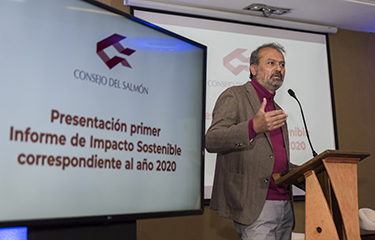The Chilean Salmon Council – formed by AquaChile, Australis, Salmones Aysén, Cermaq, and Mowi – has released its first-ever sustainable impact report.
The report reviews seven categories of the member companies’ social, economic, and environmental impacts in 2020. The release of the report just 18 months after the Salmon Council was formed “demonstrates the transparency of the trade association and its member companies and our commitment to sustainability, the environment and the communities,” Salmon Council Board Chair Fernando Villarroel said at the report’s launch.
“We are convinced that it is possible for industry development with due protection of the environment,” Villarroel said.
The seven areas reviewed – which the Salmon Council said are directly related to 11 of the 17 United Nations Sustainable Development Goals, which seek to mobilize the private sector’s contribution to sustainability – include job growth and employment, local identity, local development, production chain and entrepreneurship, scientific contribution and innovation, transition to renewable energy, and environmental impact control.
The event was attended by members companies of the council, the Sustenta+ General Manager Pablo Vidal; AquaChile President Aguas Claras Union Miriam Chávez; Multisindical workers union General Secretary Claudia Paredes; Canales Executive Director Josefina Moreno; and Los Lagos Regional Governor Patricio Vallespín.
“We want the salmon industry to commit to practices that are 100 percent in tune with environmental stewardship,” Vallespín said.
The report highlights a number of different factors, including Salmon Council member companies’ job creation and employment. Member companies are present in 36 municipalities in Chile, employing 13,000 workers directly and another 57,000 indirectly. Combined the companies held nearly 8,000 training sessions, and had 7,500 contracts with suppliers.
In addition to employment, the Salmon Council also developed 35 initiatives to support fishers and others that make use of the coastline. According to the report, those initiatives helped more than 1,000 people. A further 115 different initiatives were carried out with a focus on education, access to salmon, and respect for indigenous peoples – initiatives which benefitted nearly 130,000 people.
The companies also focused on additional scientific innovation. A total of 34 research initiatives to drive industry innovation – such as the remote fish-feeding project – were performed last year in conjunction with universities and research centers. Another 24 partnerships were signed with educational institutions.
Member companies also began to measure carbon impact by tracing the generation of carbon dioxide in the different stages of the supply chain. The companies have begun to implement emission-reduction initiatives such as the incorporation of renewable energies.
Among the companies, in 2020, a total of 104 salmon grow-out centers also voluntarily adhered to independent international certifications, such as the Aquaculture Stewardship Council standard, thus increasing the availability of responsibly grown seafood that is certified in measuring the industry’s main environmental and social impacts.
In the context of COVID-19, the report highlighted how five companies implemented protocols to protect the health of company employees, as well as the communities where they are located. Sanitary measures were reinforced, communities were supported with PCR tests, and all of the member companies’ processing plants were accredited by external organizations, the council reported.
The companies that comprise the Chilean Salmon Council grouped together in May 2021, represent more than 50 percent of Chilean salmon production. In a joint statement, they said they will "look to contribute new perspectives to the salmon farming of our country" in the future.
Photo courtesy of the Chilean Salmon Council







